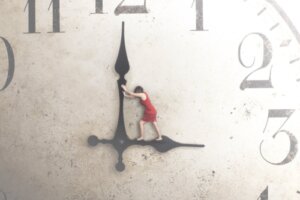The Locus of Control and Your Mental Health


Written and verified by the psychologist Elena Sanz
Over the course of your life, you experience successes and failures, and adverse and enjoyable situations. However, we all vary in how we interpret what happens to us. For instance, maybe you tend to feel responsible for things that happen. Or, you may blame others or think they’re random happenings. You tend to repeat this behavior throughout your life. It’s known as the locus of control. It has an important relationship with your mental health.
Feeling that you’re living in an uncontrollable universe and that your reality is dominated by external forces isn’t the same as perceiving that it’s in your hands to modify and make events happen. In fact, the degree to which you identify yourself as a causal agent determines your self-esteem and self-efficacy. It also predicts the probability of you suffering from anxiety, depression, or other psychological disorders.
However, this association isn’t always linear and direct. Moreover, always using the same type of locus of control isn’t necessarily appropriate.
The locus of control
The locus of control concerns where you place the origin of the events in your life. It can be internal or external. Julian B. Rotter designed this concept to designate the attributions that individuals make about the causes of what happens to them.
For example, if you have an internal locus of control, you feel responsible for your reality and believe that this is the result of your own attitudes, abilities, and behaviors. On the contrary, if you have an external locus of control, you perceive that you’re in the hands of fate, other people, or environmental factors. You see yourself as having little capacity to influence your future. For this reason, you adopt a passive attitude.
The locus of control is created in the first stages of life and remains relatively stable. Genetics have some influence, because of what we learn from our first behavior models and also because of our lived experiences. However, the two styles are generally so normalized that many people find it difficult to identify what style they have.

The locus of control and your mental health
It’s important to understand how your locus of control is configured. That’s because it has an important relationship with your mental health. It’s mainly linked to the following:
Lack of proactivity
If you have an external locus of control concerning your health, you consider that it’s not your responsibility to preserve and improve it and that there’s little you can do about it. Indeed, if your well-being depends, to a large extent, on luck and environmental elements you see as beyond your control, you won’t care about what, in reality, is in your hands.
Mental disorders have a hereditary component. Parenting styles and early experiences have an influence on them. Obviously, these are aspects on which you can’t act. But, you can work internally on your beliefs, emotions, and reactions. You can also acquire new self-regulation strategies and coping skills and adhere to psychological or pharmacological treatments.
On the other hand, if you have an external locus of control, you’ll consider these actions as lacking in value and influence and you’ll choose to anchor yourself in the “I’m just like that”, “It is what it is, I’m always unlucky” kinds of attitudes.
Depression
Research claims that depressive symptoms are linked to an external locus of control. This is because it gives rise to learned hopelessness. The individual assumes that they have no control over their environment and that their responses have no capacity to influence the course of events. In effect, they believe that they can’t generate reinforcements and can’t escape punishment.
However, the answers vary depending on the context. For instance, faced with negative events, the depressed individual tends to use an internal, stable, and global attributional style. This means they infer that the events are their fault, they’ll continue to occur and will affect all areas of their life. Yet, when faced with positive events, they use an external, unstable, and specific attributional style. This means they assume that they’re due to external causes, they won’t always be present, and they only occur in a specific context.
Anxiety
This same negative attribution style is also linked to anxiety. That’s why it’s considered to be a vulnerability factor in various mental disorders. With depression, the external locus of control translates into an inability to produce positive results. While, with anxiety, it’s related to a strong feeling of uncertainty, with the worry that this entails.
However, while it’s true that the external locus of control leads to passivity, the internal kind isn’t always the best alternative. In fact, in many cases, anxious symptoms appear when the individual places an excessive load, pressure, and responsibility on themselves. This happens because they consider that they’re responsible for absolutely everything. Therefore, they have to take care that it all goes well.
These individuals have the idea that worrying is positive and necessary. It’s a really common symptom of generalized anxiety disorder. It also leads sufferers of obsessive-compulsive disorder to use different rituals for controlling their environment and preventing what they fear from happening.

The importance of balance in the locus of control
In light of the above, it follows that the key lies in finding a healthy balance. Obviously, it’s preferable to maintain an internal locus of control, which allows you to feel that you’re in control of your life. This provides you with the motivation and energy to act. That said, you must be realistic and keep in mind that certain factors outside of yourself also affect the results.
It’s a good idea to learn to discern between what lies in your hands and what doesn’t. If you can adjust these attributions, you’ll stop feeling guilty, pressured, or defenseless. On the contrary, you’ll achieve a good acceptance of reality. This will allow you to work and improve within your capabilities.
Over the course of your life, you experience successes and failures, and adverse and enjoyable situations. However, we all vary in how we interpret what happens to us. For instance, maybe you tend to feel responsible for things that happen. Or, you may blame others or think they’re random happenings. You tend to repeat this behavior throughout your life. It’s known as the locus of control. It has an important relationship with your mental health.
Feeling that you’re living in an uncontrollable universe and that your reality is dominated by external forces isn’t the same as perceiving that it’s in your hands to modify and make events happen. In fact, the degree to which you identify yourself as a causal agent determines your self-esteem and self-efficacy. It also predicts the probability of you suffering from anxiety, depression, or other psychological disorders.
However, this association isn’t always linear and direct. Moreover, always using the same type of locus of control isn’t necessarily appropriate.
The locus of control
The locus of control concerns where you place the origin of the events in your life. It can be internal or external. Julian B. Rotter designed this concept to designate the attributions that individuals make about the causes of what happens to them.
For example, if you have an internal locus of control, you feel responsible for your reality and believe that this is the result of your own attitudes, abilities, and behaviors. On the contrary, if you have an external locus of control, you perceive that you’re in the hands of fate, other people, or environmental factors. You see yourself as having little capacity to influence your future. For this reason, you adopt a passive attitude.
The locus of control is created in the first stages of life and remains relatively stable. Genetics have some influence, because of what we learn from our first behavior models and also because of our lived experiences. However, the two styles are generally so normalized that many people find it difficult to identify what style they have.

The locus of control and your mental health
It’s important to understand how your locus of control is configured. That’s because it has an important relationship with your mental health. It’s mainly linked to the following:
Lack of proactivity
If you have an external locus of control concerning your health, you consider that it’s not your responsibility to preserve and improve it and that there’s little you can do about it. Indeed, if your well-being depends, to a large extent, on luck and environmental elements you see as beyond your control, you won’t care about what, in reality, is in your hands.
Mental disorders have a hereditary component. Parenting styles and early experiences have an influence on them. Obviously, these are aspects on which you can’t act. But, you can work internally on your beliefs, emotions, and reactions. You can also acquire new self-regulation strategies and coping skills and adhere to psychological or pharmacological treatments.
On the other hand, if you have an external locus of control, you’ll consider these actions as lacking in value and influence and you’ll choose to anchor yourself in the “I’m just like that”, “It is what it is, I’m always unlucky” kinds of attitudes.
Depression
Research claims that depressive symptoms are linked to an external locus of control. This is because it gives rise to learned hopelessness. The individual assumes that they have no control over their environment and that their responses have no capacity to influence the course of events. In effect, they believe that they can’t generate reinforcements and can’t escape punishment.
However, the answers vary depending on the context. For instance, faced with negative events, the depressed individual tends to use an internal, stable, and global attributional style. This means they infer that the events are their fault, they’ll continue to occur and will affect all areas of their life. Yet, when faced with positive events, they use an external, unstable, and specific attributional style. This means they assume that they’re due to external causes, they won’t always be present, and they only occur in a specific context.
Anxiety
This same negative attribution style is also linked to anxiety. That’s why it’s considered to be a vulnerability factor in various mental disorders. With depression, the external locus of control translates into an inability to produce positive results. While, with anxiety, it’s related to a strong feeling of uncertainty, with the worry that this entails.
However, while it’s true that the external locus of control leads to passivity, the internal kind isn’t always the best alternative. In fact, in many cases, anxious symptoms appear when the individual places an excessive load, pressure, and responsibility on themselves. This happens because they consider that they’re responsible for absolutely everything. Therefore, they have to take care that it all goes well.
These individuals have the idea that worrying is positive and necessary. It’s a really common symptom of generalized anxiety disorder. It also leads sufferers of obsessive-compulsive disorder to use different rituals for controlling their environment and preventing what they fear from happening.

The importance of balance in the locus of control
In light of the above, it follows that the key lies in finding a healthy balance. Obviously, it’s preferable to maintain an internal locus of control, which allows you to feel that you’re in control of your life. This provides you with the motivation and energy to act. That said, you must be realistic and keep in mind that certain factors outside of yourself also affect the results.
It’s a good idea to learn to discern between what lies in your hands and what doesn’t. If you can adjust these attributions, you’ll stop feeling guilty, pressured, or defenseless. On the contrary, you’ll achieve a good acceptance of reality. This will allow you to work and improve within your capabilities.
All cited sources were thoroughly reviewed by our team to ensure their quality, reliability, currency, and validity. The bibliography of this article was considered reliable and of academic or scientific accuracy.
- Alvarado, R. (2003). El Rol del Locus de Control como Factor Moderador en trastornos Ansiosos y Depresivos en los Adultos Mayores. Psykhe, 12(1). https://dialnet.unirioja.es/servlet/articulo?codigo=8486738
- De las Cuevas, C., & Peñate, W. (2015). El papel del locus de control de salud en la adherencia al tratamiento psiquiátrico. En VIII Congreso Internacional y XIII Nacional de Psicología Clínica. Granada (España), 19- 22 de noviembre de 2015. https://www.researchgate.net/publication/284403899_El_papel_del_locus_de_control_de_salud_en_la_adherencia_al_tratamiento_psiquiatrico
- Doku Ramírez, A., Fonseca Parra, L. F., González Gil, E. J., & Gualdrón Alba, J. C. (2012). Evaluación del Locus de control y su relación con las variables ansiedad y depresión en un grupo de asistentes a atención psicológica. Bachelor’s thesis, Universidad de la Sabana. https://intellectum.unisabana.edu.co/handle/10818/4072
- Sanjuán Suárez, P., & Magallares Sanjuán, A. (2006). Estilo atributivo negativo, sucesos vitales y sintomatología depresiva. Revista De Psicopatología Y Psicología Clínica, 11(2), 91–98. https://doi.org/10.5944/rppc.vol.11.num.2.2006.4020
This text is provided for informational purposes only and does not replace consultation with a professional. If in doubt, consult your specialist.







